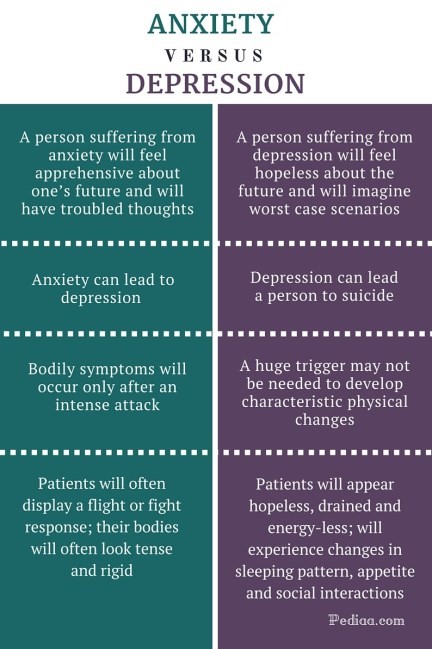by Embogama
Main Difference – Anxiety vs Depression
Anxiety and depression are two different disorders which run along similar lines. These share many common features. But it is highly important to distinguish one from the other, especially for the therapeutic purposes. The main difference between anxiety and depression is their symptoms. A person suffering from anxiety will feel apprehensive about one’s future and will have worried thoughts. Whereas a person suffering from depression will feel hopeless about the future and will imagine worst case scenarios. Depression can occur in a person following an attack of anxiety. This is the main reason why these two conditions are difficult to be identified clearly in an affected person.
What is Anxiety
Anxiety is usually characterized by doubtful and vulnerable thoughts about future events, which have not happened yet. People suffering from this condition are extremely worried about their future goals and targets, and they fear that they will ultimately become a failure. Affected people will complain of anxious thoughts involving various life events, unexplainable physical sensations, and self-guarding behavioral patterns. One of the hardest things for anxious people to do is, explaining what they are going through and what they are feeling to others, which is a good catch- up line for psychiatrists in making the diagnosis.

What is Depression
People who are depressed do not show the same fear and doubtful thoughts about their future like those who are with anxiety. Instead, they are certain that their future is going to be disastrous. They highly believe in their own perceptions about horrible things which are going to take place in the future. Depressed people are often sad, have no interest in enjoying things they used to enjoy before, feel hopeless and lonely, have difficulty in concentrating, and suffer from sleepless nights, sleepy day times or change in the sleep pattern, experience unexplained physical aches, change in appetite and feelings of death and suicide.
Moreover, depressed people often think that it is not worth to try to get over a bad future. They have taken the negative thoughts into their heads in such a severe manner, that there is no choice left for them rather than facing the disastrous future or committing suicide.
Difference Between Anxiety and Depression
The best way to differentiate anxiety and depression from one another includes the careful observation of the behavior of the affected people and listening to their feelings and experiences.
Behavior and Feelings
Anxiety: Anxious people will be uncertain about things which might happen, develop fearful sensations and start worrying about them. These disturbing thoughts will give rise to feelings of escaping or avoiding certain things, just to get rid of further anxiety.
Related: Health Disparities in the Black Community
Depression: Depressed people ‘know’ that their future is going to be disastrous; they picture their future with worst possible scenarios that can happen. As a result, they become hopeless with no positive beliefs about life. They tend to think over and over again about these imagined negative life events, and ultimately reach a point which carries the thought of escaping from life; suicide.
Relationship Between Anxiety and Depression
Anxiety: Anxiety can be early symptoms of depression.
Depression: Depression can occur in a person following an attack of anxiety since they might feel hopeless and drained after dreadful thoughts about a bad future.
Symptoms
Trigger
Anxiety: Bodily symptoms will occur only after an intense attack.
Depression: A depressed person may not need a huge trigger to develop characteristic physical changes.
Bodily Symptoms and Responses
Anxiety: A person with an attack of anxiety will often show a flight or fight response which includes shaking, sweating, raced heartbeat, flushing, bowel needs (nausea, vomiting, and diarrhea), hyperventilation and the need to run. Their bodies will often look tense and rigid. Also, they might get the symptoms of underlying co-morbidities triggered. For example, a heart patient who is on anti-arrhythmic drugs might develop palpitation or chest pain together with the other symptoms of anxiety.
Depression: A depressed person will appear hopeless, drained and energy-less. Their faces will often look blank without emotions, prefer staying still or have very slow movements. They will also experience changes in sleeping pattern, appetite and association with other people. They would rather spend time alone than hanging out with friends like they used to do.
It is highly encouraged to identify the affected individuals and help them to seek medical advice because both these conditions can lead to secondary effects of one another, which will drastically pull down the individual performance and quality of life.

